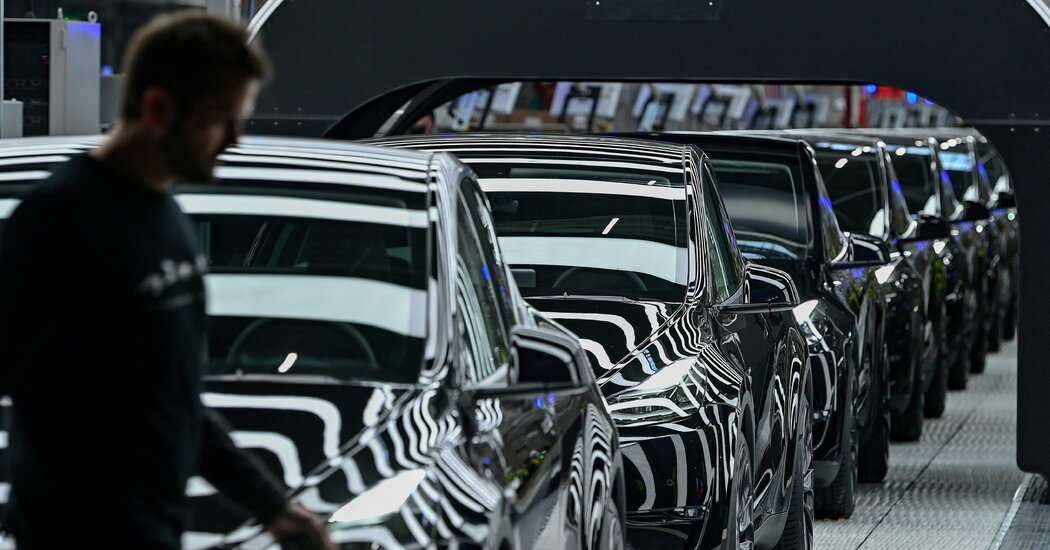
Tesla’s chief executive, Elon Musk, plans to cut 10 percent of the electric carmaker’s salaried work force, he told staff in an email on Friday.
The job cuts will not apply to employees who build cars or batteries or who install solar panels, and the number of hourly employees will increase, Mr. Musk said in the email, a copy of which was reviewed by The New York Times. “Tesla will be reducing salaried head count by 10 percent, as we have become over staffed in many areas,” he said.
Reuters reported the news earlier, citing a different email that Mr. Musk sent only to Tesla executives. The automaker’s share price closed on Friday down about 9 percent after that article was published.
Tesla’s staff has grown substantially as sales have surged and it has built new factories, including two that opened this year near Berlin and Austin, Texas. The company employed more than 99,000 workers at the end of last year. Just two years earlier, Tesla had 48,000.
Mr. Musk and Tesla did not respond to requests for comment.
Earlier this week, Mr. Musk told employees at Tesla and SpaceX, his rocket company, that they were expected to spend at least 40 hours per week at their offices.
“The more senior you are, the more visible must be your presence,” Mr. Musk said in an email to SpaceX employees on Tuesday. “That is why I spent so much time in the factory — so that those on the line could see me working alongside them. If I had not done that, SpaceX would long ago have gone bankrupt.”
That announcement thrust Mr. Musk and his companies into a hotly contested debate over the right approach to restoring normalcy after two chaotic years of the pandemic. It also invited concern that he may drive away top performers who would prefer to continue working remotely some or all of the time.
The new layoffs won’t be the first ones at Tesla. The automaker also dismissed some workers in 2017 and 2018.
In recent weeks, investors have begun questioning the company’s sky-high stock price. The market values the company at more than $728 billion, more than several other large automakers combined. Tesla’s shares are down about 40 percent from their high at the end of last year, bringing attention to the risks the company faces from growing competition, accusations of racial discrimination and production problems at its factory in Shanghai.
Some critics view Mr. Musk’s bid to buy Twitter as yet another distraction that could hurt Tesla. One big concern for some investors is that the automaker’s board lacks enough independence from the chief executive to serve as a check on him and his impulses.
How Elon Musk’s Twitter Deal Unfolded
A blockbuster deal. Elon Musk, the world’s wealthiest man, capped what seemed an improbable attempt by the famously mercurial billionaire to buy Twitter for roughly $44 billion. Here’s how the deal unfolded:
“From a corporate good-governance perspective, Tesla has a lot of red flags,” Andrew Poreda, a senior analyst who specializes in socially responsible investing at Sage Advisory Services, an investment firm in Austin, told The Times last month. “There are almost no checks and balances.”
Mr. Musk’s management style and success — he is listed as the world’s richest man by Bloomberg and Forbes — have earned him admirers but have made him a lightning rod. Tesla has lost a number of top executives in recent years, many of whom have gone on to top jobs at other automakers, tech companies and battery makers.
Recently, Mr. Musk praised the work ethic in China, where labor conditions can be harsh or even abusive, suggesting that workers in the United States were lazy. “They won’t just be burning the midnight oil. They’ll be burning the 3 a.m. oil,” he said about Chinese workers in an interview with The Financial Times. “So they won’t even leave the factory type of thing. Whereas in America, people are trying to avoid going to work at all.”
Still, some analysts remain bullish about Tesla’s prospects. “In our view, Tesla likely does not need to hire any more employees to maintain its growth, and we think the plan to reduce the work force likely shows that Tesla over hired last year,” Seth Goldstein, a senior equity analyst at Morningstar, said in a note on Friday.



